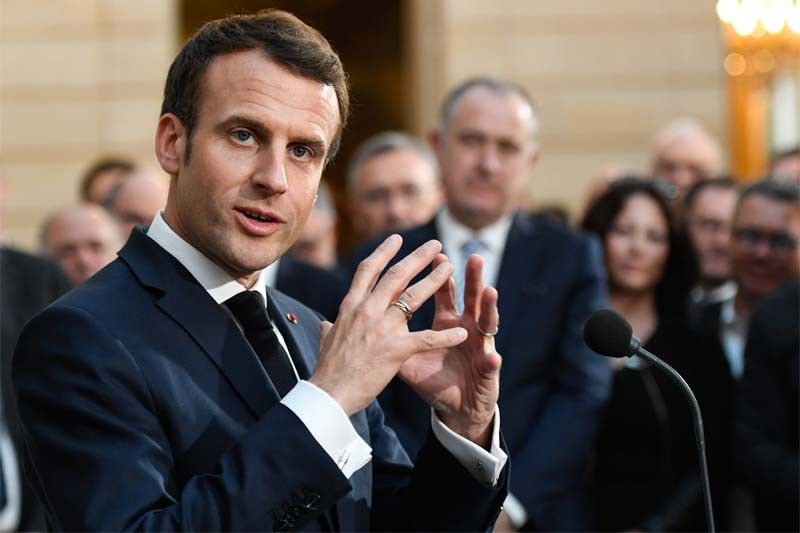Macron looks to galvanize EU on China as Xi visits France

PARIS, France — Chinese President Xi Jinping heads to the French Riviera on Sunday for the final leg of his European tour, as France's Emmanuel Macron looks to forge a united European front to contend with China's global ambitions.
Xi's trip will begin in the Mediterranean city of Nice and a stop in the nearby principality of Monaco before face-to-face talks with Macron.
On Monday, the two leaders head to Paris for the official state visit, marking 55 years since Charles de Gaulle broke ranks with the West to establish diplomatic relations with the Communist nation.
A series of cooperation deals on nuclear power, aerospace and clean energy initiatives, some involving lucrative contracts, are expected to be signed.
But Xi's visit poses a particular challenge for Macron, who wants to deepen EU ties with China while also pushing back against Beijing's growing clout.
Europe's distrust of Huawei, which is poised to become the dominant player in next-generation telecom networks worldwide, is emblematic of the increasingly rocky relationship.
"We have a lot to do together in terms of climate action, in terms of multilateralism, but we also have to defend our own interests," Macron said in Brussels on Thursday.
He has lauded the EU's "awakening" to the challenges posed by China, which the bloc now labels a "rival" despite becoming Europe's biggest trading partner.
"The reality is that the world has changed significantly -- China is not the country it once was, and we are dealing with a very major partner," a Macron aide said ahead of Xi's visit.
On Tuesday, Macron and Xi will be joined by German Chancellor Angela Merkel and EU Commission president Jean-Claude Juncker to explore "points of convergence" ahead of an EU-China summit in Brussels next month.
Two-way Silk Road?
Xi arrives in France from Italy, which has angered its EU partners by formally joining China's "new Silk Road" initiative for a string of maritime, rail and road connections aiming at expanding Chinese trade.
Macron is expected to press his call for increased "reciprocity" regarding market access to China, in particular Beijing's demands that foreign companies hand over vital technological know-how in order to invest in the country.
"If we're going to talk about a new Silk Road, then it must be one that goes in both directions," Finance Minister Jean-Yves Le Drian told BFM television on Friday.
Telecom giant Huawei is another fraught issue at the centre of a dispute over the rollout of crucial 5G mobile network infrastructure.
The US is pressuring European allies to not use the Huawei technology, saying it creates a security risk by potentially letting Beijing snoop on sensitive communications.
Yet so far France has not ruled out using Huawei gear -- and Monaco has already signed a deal with the Chinese giant to roll out a 5G network as soon as this year.
Beijing has bristled at the suspicions, accusing Washington of trying to escalate President Donald Trump's trade battle with China.
"China is hoping that Europe can show more autonomy (on Huawei), which would be better for future cooperation," said Xu Tiebing, a professor of international relations at China's Communication University in Beijing.
'Reality very different'
Despite the many sources of friction, France's goal is to engage China as a closer partner as Washington makes a pointed withdrawal from global affairs under Trump's "America First" policy.
For example, Macron may seek more Chinese support of the French-backed G5 Sahel force fighting Islamic extremists in Western Africa.
China has been investing heavily in a diplomatic offensive across Africa, promising to help build infrastructure projects as part of the new Silk Road, officially called the Belt and Road Initiative.
Aides say Macron will press Xi to ensure such projects are fair and explore the participation of French companies amid allegations the deals could load African countries with unsustainable debt loads.
He is also expected to urge Xi to commit to the ambitious global bid to cut carbon emissions, though analysts note that China is still building dozens of coal-burning power plants.
France also plans to voice concerns about rights abuses against China's Uighur Muslim minority, including allegations of mass internments in the restive Xinjiang province.
"China talks about defending multilateralism and humanity's common future to anyone wanting to listen, but the reality is very different," said Emmanuel Dubois de Prisque, a China expert with the Thomas More Institute in Paris.
- Latest
- Trending

































